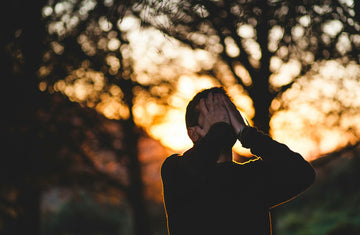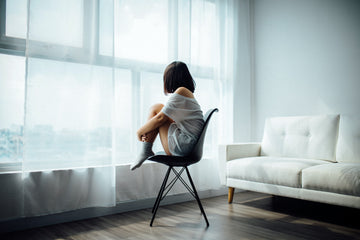Anxiety comes in waves. And when it hits, it takes over any thoughts or feelings you were previously having. With each wave, the tension increases. And your anxiety can reach its peak, leading to many negative side effects and symptoms. So let’s talk about why this happens and what you can do to quell your anxiety.
The Root of Anxiety
At the root of anxiety, ultimately, is fear. Anxiety is a strong reaction and tension caused by this fear.
But where does fear come from? It can come from many places, but mostly it comes from a past traumatic event (or events) transmitted to the present moment and your expectation of the future.
Anxiety is a complex and multifaceted emotional and psychological experience. But some of the most common contributing factors include:
- Genetics: A family history of anxiety disorders may increase the likelihood of anxiety
- Brain chemistry: Imbalances in neurotransmitters like serotonin and dopamine can contribute to anxiety
- Personality: Certain personality traits, like perfectionism or a tendency to worry, can make you more prone to anxiety
- Environmental stressors: High-stress environments, big life changes, or chronic stress can trigger or exacerbate anxiety
- Trauma: Past traumatic experiences, especially during childhood, can significantly impact mental health and contribute to anxiety
Again, while any combination of these factors can be involved in anxiety, fear is the most common culprit. It exacerbates and sometimes drives the other factors, making the worry develop into full-blown anxiety.
How Anxiety Negatively Affects Your Health
When anxiety hits like a freight train, you are no longer in the present moment. You are either being pulled backward by past trauma or fearing what will happen in the future. Your consciousness has flown away from the now.
Because of this, the body is in tension, experiencing everything you did in the past or what you think your experience will be in the future.
Untreated anxiety can have a range of negative effects on your mental, emotional, and physical well-being. Here are some potential consequences:
- Impaired daily functioning: Anxiety can interfere with daily activities, making it difficult for you to concentrate, make decisions, and perform routine tasks
- Physical health issues: Chronic anxiety has been linked to physical health problems like cardiovascular issues, digestive disorders, headaches, and compromised immune function
- Sleep disturbances: Anxiety can disrupt sleep patterns, leading to insomnia or other sleep disorders
- Social isolation: Untreated anxiety can lead to avoiding social situations due to fear or discomfort, leading to social isolation and loneliness
- Depression: Anxiety and depression often coexist, and untreated anxiety can contribute to the development or worsening of depressive symptoms
- Substance abuse: Some people turn to drugs or alcohol as a way to self-medicate and cope with their anxiety, leading to the potential development of substance abuse issues
- Lower quality of life: Your overall quality of life can be significantly diminished, impacting your work, relationships, and personal satisfaction
How To Calm Your Anxiety
Anxiety can be tough to tackle, and you may not want to immediately go to traditional modern medicine. The good news is, there are several natural strategies that can help alleviate anxiety symptoms. Different methods work for different people, so try the below tips and see which works for you.
Regular Exercise
Physical activity has been shown to reduce anxiety and improve mood. Aim for at least 30 minutes of moderate exercise most days of the week. Basically, take a walk around your neighborhood every or most days a week, especially when you start to feel anxious.
Deep Breathing Exercises
Practice deep breathing techniques, like diaphragmatic breathing or focused breathing exercises. This will help calm your parasympathetic and sympathetic nervous systems.
Mindfulness Meditation
Mindfulness and meditation practices can help you relax and reduce stress. Techniques like mindfulness-based stress reduction (MBSR) can help calm your parasympathetic and sympathetic nervous systems.
Yoga
Yoga combines physical postures, breath control, and meditation, offering a holistic approach to managing anxiety and stress. If it sounds overwhelming, start with the most basic and simple yoga positions.
Adequate Sleep
Do your best to get enough quality sleep, as sleep has a significant impact on mood and anxiety levels. So stick to your bedtime routine, avoid screens right before bed, and consider taking a natural sleep aid.
Healthy Diet
Eating a balanced and nutritious diet is very important. Avoid things that can exacerbate your anxiety, like excessive caffeine, sugar, and processed foods.
Social Support
Be sure to maintain connections with friends and family. Sharing your feelings and receiving support is critical to feeling safe, which can help curb your anxiety.
Journaling
Write down your thoughts and feelings in a journal. This can help you gain clarity and perspective on your emotions, which can help you manage them in the future.
Herbal Supplements

So many people find relief from anxiety symptoms with herbal supplements and plant-based tinctures.
For anxiety, one of the best options is the superfood powder mixes in The Wellness Trio. These three powders are carefully formulated with a powerful combination of natural ingredients. They can help you feel less stressed, have more positive thoughts, and stay full of non-jittery energy.
Why is this the best option for anxiety?
These are adaptogenic superfood powder mixes, which are plants or mushrooms that help your body respond well to stress and fatigue.



